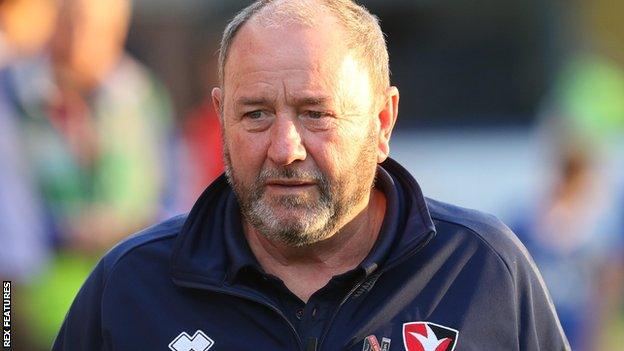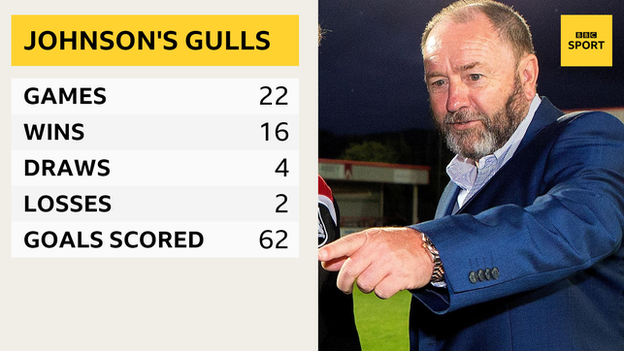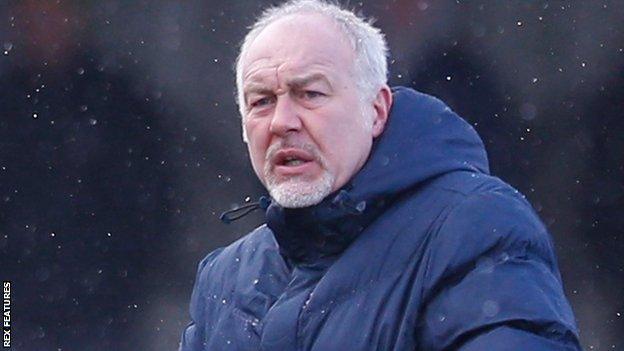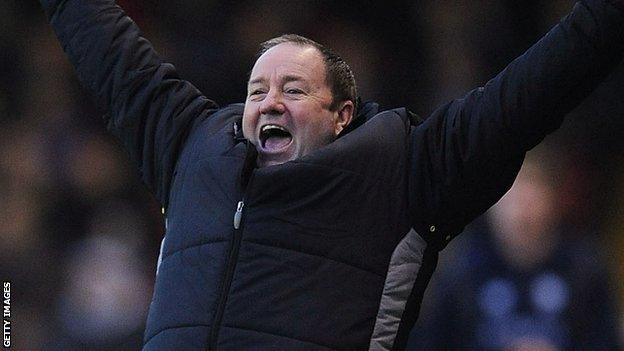How Gary Johnson turned Torquay United around in four months
- Published

Gary Johnson began this season as Cheltenham Town boss, but was sacked after four games
When Gary Johnson took over as Torquay United manager in mid-September, he inherited a club in crisis.
A rare fully professional side in the semi-professional National League South, Torquay were 14th in the table and still reeling from relegation to their lowest level in the English game.
Fast forward four months and the former Bristol City, Cheltenham and Yeovil boss has the Gulls flying. A record run of 10 successive wins in the sixth tier has seen the 63-year-old's free-scoring side go top of the table.
"He's been fantastic," says lifelong fan Dominic Roman. "We couldn't believe we got him as manager.
"He's brought so much. Right from the start he's got the rapport back with the fans and players, suddenly we've got a lot of belief around the club."
It has certainly been a tough few years for Torquay fans. A number of different owners, relegation from League Two, then dropping out of the fifth tier in 2018 only tells half of the story.
Off the field, supporters have been unhappy with owner Clarke Osborne's leadership. The businessman took over the Gulls just over two years ago and his plan to move the club to a new ground has not been popular.
On the field, things were not much better. Osborne sacked well-respected former player Kevin Nicholson as manager just four games into last season and eventually replaced him with Gary Owers.

But the former Forest Green Rovers boss could not reinvigorate Torquay and they were relegated with two games left in the season. Following a run of three wins in their first nine games this campaign, Owers was out.
"We were at our lowest ebb, the football was drab, it was just 'don't lose' football rather than go out to win," Roman told BBC Sport.
"Fans were turning up at the start of the season, but within a month it was tailing off when they saw how bad it was."
Johnson's immediate impact
Paul Mulhern has been covering Torquay for BBC Radio Devon this season, and recalls Johnson's first home game almost three weeks after being appointed.
"Torquay went 2-0 down to Woking, and about five minutes before half-time he made two substitutions to make a point to the players and the fans," Mulhern said.
"When the team came off, rather than moans and groans, I could literally feel a different atmosphere about the place. The fans still had belief, and in the end Torquay came out and got a draw."

Under former manager Gary Owers, Torquay scored just 39 goals in 46 games
Since then, it has been a different story. Unbeaten in 16 league games under Johnson's tenure, Torquay are two points clear of second-placed Woking in the National League South table.
Johnson's side have scored 62 goals in 22 games in all competitions, in comparison to the record under Owers - just 39 goals in his 46 matches in charge.
"A lot of the squad is still the same as it was under Gary Owers, but the respect Johnson has gives them confidence," says Mulhern.
"We did his first pre-game interview and I chatted with him off mic - he told me the one thing he would tell the players was: 'Don't be scared - if you miss five chances, don't be scared to go for the sixth.'
"He told me he felt they were playing with a bit of fear. His mantra was don't be scared to make a run or try a shot, and he's got into the heads of a few of them."
Promotion or bust?

As well as managing Latvia's national team, Gary Johnson led Bristol City to the Championship play-off final in 2008
So what does the man himself think?
"When I took the job, I was hoping for the success we've had so far," said Johnson.
"But it's been a miraculous effort really. We're very proud of what we've done very quickly because we've put ourselves in a very strong position quite early from when we took over."
And when asked if failing to win promotion back to the fifth tier would be seen as a failure, Johnson was in no doubt about his answer.
"Definitely from me. That's our aim," he said.
"Everybody else will be disappointed because we have put ourselves in a strong position, but we can all talk a good game, it's only just halfway into the season and we've got a lot of games to go so we've got to stay focused."
Improved relations off the field
Johnson's success has also boosted the crowds at Plainmoor from about 1,200 towards the end of the Owers regime to 4,000 on 26 December when the Gulls hosted Truro City.
The club took more than 2,700 'away' fans when the two sides had their reverse fixture on New Year's Day as the Cornish side, who were groundsharing at Plainmoor, were technically the home team.
But behind the scenes there are still worries around the owner's plans for the future, although he finally appointed his first directors after almost two years in charge in November.
"I think there's an underlying concern with the people who are really into the club and looking into the long term rather than the short term, but a huge proportion of the supporters only care if we're winning," says Roman.
"The fans don't particularly want the new stadium, but there's not an uproar like there was before as results are going well.
"If it were to go any further the fans would push back and make it noted that we don't really need a new stadium, not at the present time anyway."